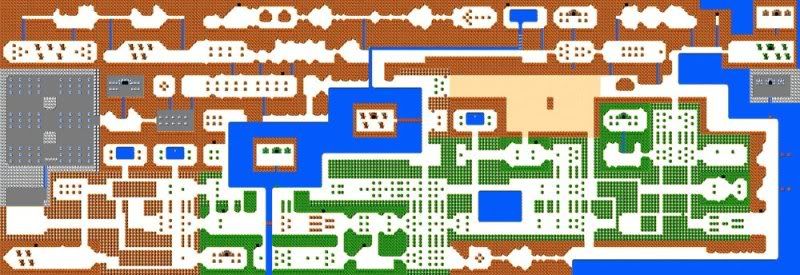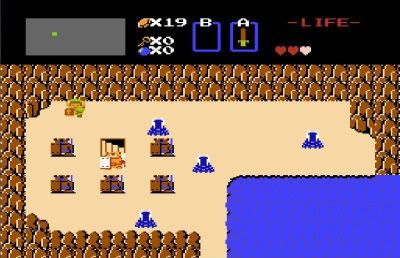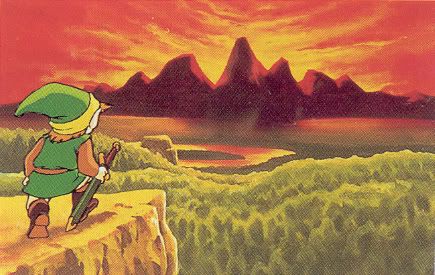


|
Our Twilight Princess game guide keeps expanding! Everything for the game you're looking for can be found at TDC—Walkthroughs for every dungeon, Boss strategies, Bottle locations, Golden Bugs, Oddities, Secrets & Sidequests, and so much more! |
|
[Blogging]
What Makes Zelda Great - The Legend of Zelda 23 Dec 2008 — by Alpha |
|
Even though an entire franchise has been based on it, The Legend of Zelda remains one of the most innovative and original in the series. Several aspects of the Zelda series as a whole managed to be best used in this title, either being overlooked or toned down in the sequels. And even in areas that it isn't the best at, LoZ manages to do several other things notably well. As soon as you start a new game you can see one of the game's most appealing – and at the same time, most frustrating – aspects: that of a colossal overworld. The land of Hyrule is absolutely enormous, and it can take players a long, long time to even start getting a feel for it. This is both good and bad; every time you turn on the game (at least for the first couple hundred times, I'm sure) you're sure to feel overwhelmed by the vast maze that the overworld presents. And the landscape is always varying; you can go straight from forests to the beach to the desert to the mountains and so on. It's also easy to get lost, which can be annoying at times – but if you put up with it, Hyrule's vastness can become one of the game's most endearing properties.  Face it, this place is HUGE! One of the bonuses about this overworld is that this game occurs in a Hyrule that is, for the most part, devoid of obstacles that keep you from accessing certain areas of the world. There aren't any triggers you have to activate before you can enter different regions, which leads into the next strong point of the game: the non-linear gameplay. From the get go Link can access most of the nine dungeons in the game. If you want to start at Level 8, go right ahead. It may not seem like much, but when you compare it to more recent Zelda games you can start to see how important an aspect the freedom of choice can become. The latest games, Twilight Princess and Phantom Hourglass, were both relatively linear, constricted by their storylines so that you had to follow the overall path set by the developers. It's unfortunate that the non-linear property has been lost over time - in fact, The Legend of Zelda is the only game in the series where the majority of dungeons can be entered from the very beginning of the game, providing you with a vast degree of freedom. You're never constricted to doing one thing after another – instead, you can craft your own story as you go along. Speaking of freedom of movement, another thing LoZ does magnificently is including a vast number of secrets. The overworld is full of random bombable walls with secrets inside, and hidden stairwells aren't uncommon either. What's also unique is how these things are hidden – you might bomb a rock wall to find a hidden hole. Maybe bringing a statue to life by touching it will reveal that it was sitting over some stairs. Maybe burning away a random tree will reveal the entrance to a dungeon. You never know what you'll find until you explore every square inch of the world.  So wait, Alpha wasn't lying about that moving statue?! Now here's a feature that has never truly been replicated in any Zelda game since, and is probably the most amazing aspect of the game in my mind: the Second Quest. After beating the game once (or by using a special and not-terribly-difficult-to-remember code), players could go through Hyrule a second time. The overworld looked the same . . . but the dungeons and secrets were all in completely different places. People who thought they had mastered the game learned how very wrong they were when they found themselves stumbling around Hyrule in search of the first few dungeons – and once they did manage to find one, the difficulty level had been bumped up again. And that's on top of the original play-through's difficulty, which is saying something. LoZ is certainly one of the hardest games in the series. Several of the dungeons have multiple boss enemies in them, bosses you will have already beaten in earlier dungeons, with a new Boss at the end of the dungeon guarding the Triforce Fragment. And actually, in my opinion, even facing multiple bosses in a row cannot compare to entering a room that has five or six Darknuts wandering around randomly. Maybe I just haven't practiced fighting them, but for goodness sake, I die almost every time I enter one of those rooms! The game was an instant classic, to be sure, but it had its faults, which I'll list here as a bit of closure. Two 'problems' with the game have already been discussed: the difficulty and the overworld's confusing nature. It's hard enough that it can deter players that started playing Zelda post-NES era; face it, these days people are used to easier games than they were way back when LoZ came out. With the level of difficulty found in The Legend of Zelda, gamers aren't always inclined to keep playing because it seems like the game is geared against success . . . which, one could argue, it is. The fact remains true. Why would anyone want to put down the game, though? Well, it stems from another missing element in the origin of the Zelda series – LoZ lacks an in-game storyline completely, and has only a few minor characters. The Zelda franchise is known today for having great stories and engaging NPCs – something that is hardly fleshed out in this game. Without these elements, there is nothing emotional attaching you to Hyrule; sure, there's the sense of adventure you can get every time you pick it up, but there sometimes seems to really be no motivation towards defeating that nearly impossible dungeon. After all, all you'll find is a Triforce Fragment. There's no surprise waiting for you at the end of the tunnel, especially not today when you can look up the game's ending on YouTube if you want. And I'm not going to even go over the mistranslations that occurred in bringing LoZ over to America. After all, it's a secret to everyone (cue the groans!). So there are some faults, but make no mistake about it: The Legend of Zelda is a fantastic game that gamers should strive to play and beat. In these articles, I'm going to try and find a single word or phrase that encapsulates what really makes each game great in its own right – for LoZ, I think the most fitting is that it truly is “The Original”. Pioneering a truly impressive array of features and many hours of well-spent gameplay, it has become a legend in its own right, and spawned legend after legend since it was released in Japan in 1986.  The Legend of Zelda – "The Original" Next time around, we'll take a look at what many call the black sheep of the series: The Adventure of Link. I'm currently on vacation at the time of this article's posting (hooray for CuteNews' timer!), so I'll post the topic in the forum on Sunday when I get back. Until then, this is Alpha, signing off to go do . . . stuff. Oh, and happy holidays! |
|
by MagmarFire @ 23 Dec 2008 09:11 pm
|
|
by darklink @ 12 Jan 2009 06:39 pm
|